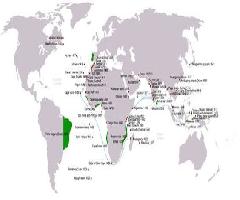There were various motivations and factors that caused as well as promoted the European conquest of Native America that are examined below. The European conquest of, and encounter with Native America had some drastic as well as profound effects for both the Europeans and Native Americans, which will also be discussed. Portugal and Spain were the first European powers that attempted to conquer and encounter Native America, which in turn influenced others to become involved, especially Britain and France.
The original cause of the Europeans encountering and then subsequently conquering Native America was its unexpected discovery. When Christopher Columbus set sail
on his first voyage in 1492 he intended to reach India or China by sailing west. Instead of reaching the Far East, Christopher Columbus and his small fleet of ships inadvertently landed in the West Indies. At the time Columbus was actually bitterly disappointed that he had not reached India or China and not been able to gain a share of the lucrative spice and silk trades. Christopher Columbus’ initial encounter with Native America and the West Indies would set the tone for the subsequent European conquest of, and subsequent encounter with the Caribbean as well as the Americas.The Papacy had an important if similarly unplanned influence as well over how the Europeans conquered and then subsequently conquered and encountered Native America as it had decided to divide the world into two. Or at least the African, Asian, and American parts of it between the Iberian kingdoms of Portugal and Spain. This division allowed the Spanish to claim and conquer all of the Americas except for Brazil, which was claimed by the Portuguese. Portugal and Spain had full authority from the Papacy to takeover all of the territories that they had either discovered or were in fact shortly to discover. The Vatican unintentionally shaped the future of millions of people and of Native America not to mention Portugal and Spain by a simple decision.
Although Christopher Columbus had discovered the West Indies and therefore the Americas by accident the causes behind his voyages as well as those of the Europeans that were to follow him were basically the same, to make money, and to conquer land. Columbus was disappointed with the limited amount of silver and gold that he had been to find and obtain from the indigenous peoples in the West Indies, as it would not meet the demand for precious metals back in Europe.8 Columbus also found out that substantial amounts of money could be made from the growing and then the selling of cash crops such as sugar and tabacco to the Europeans.
After reaching the region other Europeans soon discovered that the West Indies were very close to North and South America offering the prospects of greater conquests besides vast treasures to be seized. The indigenous peoples that the Spanish had come across in the West Indies had no concept of the value of silver and gold, which goes a long way to explain why they had handed it over or sold it to the Europeans so cheaply. The Spanish adventures and conquistadors that went on to conquer Latin America were certainly not disappointed by the unprecedented amount of silver and gold that they found there. The discovery of vast quantities of silver and gold caused many Portuguese and Spanish to go to the New World in order to make their own personal fortunes instead of facing financial hardships by staying at home. Of course the amount of wealth that Portugal and particularly Spain extracted in the form of precious metals and cash crops from Native America encouraged the English, the Dutch, and the French to seek territories in the West Indies as well as the Americas. The other Europeans would also attempt to make money by trading with the Portuguese and Spanish, piracy, and eventually to replace the massive loss of live amongst the indigenous peoples of Native America by selling slaves to work in the region.
A less selfish cause for the Europeans to conquer and encounter Native America was in order to convert its indigenous populations to the Christian religion. The Portuguese and the Spanish governments were anxious that once the territories in the New World were conquered and seized to be part of their respective empires then the indigenous peoples of Native America had to be conscripted into the Roman Catholic church as soon as possible. The Roman Catholic church had in any case quickly established a presence in Native America yet its conversion activities were not always regarded as being a priority by the European colonists that had got to the region first. Silver and gold besides using the indigenous peoples to produce cash crops or mine further quantities of precious metals were more important than spreading the Christian religion.
There were various effects of the European conquest of, and subsequent encounter with Native America. For
the Portuguese and most especially the Spanish colonists and government the effects of conquering and also encountering Native America were generally considered to be beneficial. Spain gained vast new territories from California to Chile, which made the Spanish empire larger than any other European empire until the 18th century. The gaining of extensive colonies in Native America certainly raised the international prestige of Spain.The extraction of silver and gold bullion besides the profits from the sale of cash crops generated a great deal of revenue for the Spanish government that should have made Spain the richest country in Europe. Aside from vastly increasing the revenues of the Spanish government the effect of conquering Native America also made large fortunes for the conquistadors and colonist landowners.16 The Spanish colonists gained greater long-term benefits from their conquest of, and subsequent encounter with Native America than the Spanish government, which spent even more substantial amounts of money on numerous European wars. Despite the revenues from its American colonies the Spanish government went bankrupt five times during the 16th century.
The Portuguese and Spanish conquest of, and subsequent encounter with Native America had the effect of spreading the desire of other European countries to gain empires in North and South America. However the British, Dutch, and French took longer to gain colonies in the West Indies and the Americas as the Portuguese and Spanish had seized the most commercially lucrative colonies in the region. The British and the French would eventually compete for the control of North America, ironically the new United States would treat Native American tribes more harshly than the British and French ever did.
For Native America its conquest and also its subsequent encounter with the Europeans was ultimately disastrous for its indigenous peoples. The Portuguese and Spanish brought with them all be it unintentionally European diseases such as small pox that were new to the region and that were particularly deadly for the indigenous peoples of the West Indies and the Americas. The imported European diseases killed millions of the indigenous peoples, perhaps up to four-fifths of the pre-conquest population of Native America. Such drastic loss of human live led to the Portuguese and Spanish instigating the Transatlantic slave trade to provide enough labour to work upon the sugar, coffee, and tabacco plantations of the West Indies and Latin America. Those indigenous peoples of Native America that survived the devastating European diseases and subsequent generations found that their new Portuguese dominated their lives and Spanish masters, they might have been slaves too. The arrival of the Spanish in particular had the very profound effect of destroying the indigenous empires of the Aztecs, Incas, and the Mayans besides ruling the remaining tribes of Native America. Perhaps it should be no surprise that it took longer for the Europeans to gain control over the tribes of North America, as they had no cities or empires that could be directly overthrown.
The over all causes of the European conquest of, and subsequent encounter with Native America was the desire to gain wealth and also territory. The vast wealth obtained in the conquest and encounter with Native America went both to governments and the European colonists that chose to settle there. The European colonists that became landowners had the opportunity to make money from the mining of precious metals as well as the production of cash crops upon frequently extensive plantations. All the lands that were conquered were incorporated into vast new Portuguese and Spanish empires. In the three centuries or so that the Portuguese and Spanish vast quantities of wealth were gained from precious metals and cash crops. The Portuguese and Spanish governments also allowed the Roman Catholic Church to convert the indigenous peoples of Native America as well as the African slaves to the Christian religion. The effects of the European conquest of, and encounter with Native America were much better for the European invaders and colonists than for the indigenous of the region. After all the importing of European diseases and over work killed millions of the latter and caused under population in the region solved by the introduction of the Transatlantic slave trade.
Bibliography
Altman I, 'The Contact of Cultures: Perspectives on the Quincentenary', American Historical Review, 99 (1994), pp.478-503.
De Acosta J, (2002) Natural and Moral History of the Indies, Durham
Roberts J.M, (1996) A History of Europe, Penguin, London
Williamson E, (1992) The Penguin History of Latin America, Penguin, London & New York
Wolf E, Europe and the People without History [1982]
Woodruff W, (2005) A Concise History of the Modern World, Abacus, London

